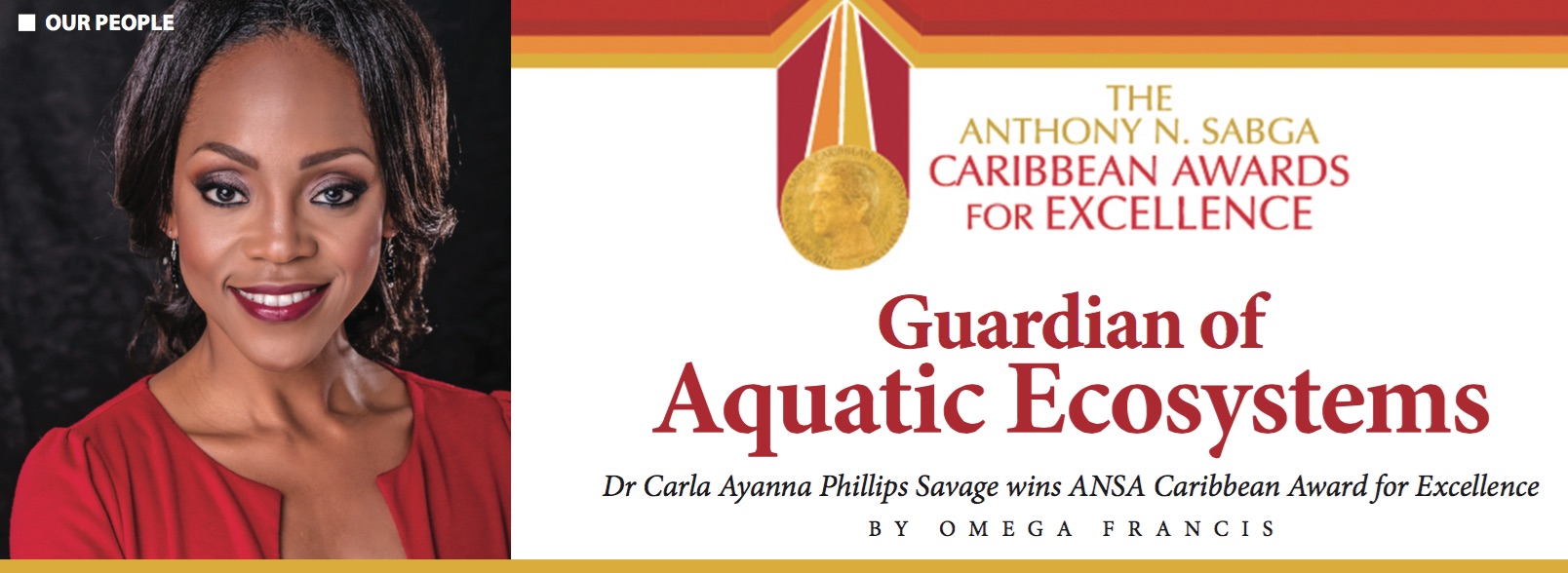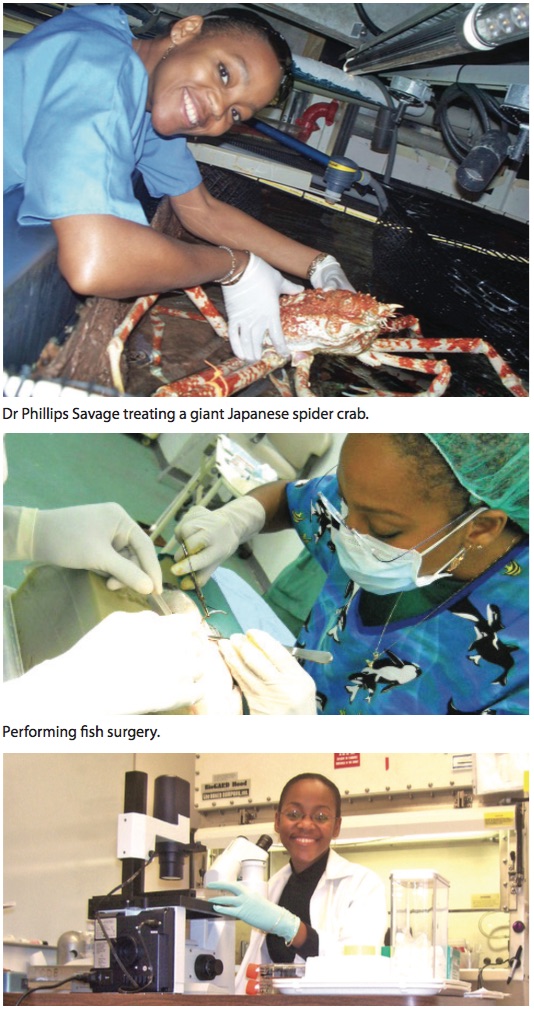
Dr Carla Ayanna Phillips Savage is a veterinary surgeon, aquatic One Health practitioner, and a guardian of aquatic ecosystems. Since returning to Trinidad 11 years ago, she has worked arduously towards one of her largest professional goals: to champion aquatic ecosystem health, conservation, and management. This work has been recently recognised and she has been jointly awarded the ANSA Caribbean Award for Excellence (Science and Technology).
“I am happy to be pioneering the field within our region and it means a lot that our Caribbean colleagues felt what I was doing was noteworthy,“ she says.
However, her journey was not a straight shot to the top. Dr Savage’s story goes back more than 30 years to when she was taken to Sea World by her mother as an 11-year-old girl. There, she was so entranced by the orcas that she told herself she wanted to one day work with whales and other aquatic animals. Throughout secondary school, she maintained this pursuit but found that unfortunately there was no avenue to work with orcas in Trinidad and Tobago. Eventually, her ambition appeared to be nothing but a far-fetched dream.
By the end of secondary school, Dr Savage had a hard decision to make: pursue marine biology, or veterinary medicine? While marine biology seemed like the obvious path to working with aquatic species, she ultimately decided to pursue veterinary medicine at The UWI St Augustine’s School of Veterinary Medicine (UWI-SVM). While in her third or fourth year, Dr Savage got the opportunity to do a research project on aquatic animals. Her project on viral diseases in shrimp was the first ever aquatic animal-based student project to be conducted at the School and turned out to be well-received and highly graded.
Upon completion of her degree in Veterinary Medicine (DVM), she was employed as a teaching assistant in the Large Animal Unit at the UWI-SVM and started pursing an MPhil in Large Animal Medicine, anticipating that she would make this field of veterinary medicine her area of expertise. While completing her MPhil, she received a Fulbright Scholarship with the opportunity to pursue a PhD. With her mind set on doing a PhD in ruminant theriogenology (the branch of Animal Science concerned with reproduction), the Acting Director of the Vet School at the time, Dr Winthrop Harewood, reminded her of her earlier passion for aquatic animals and pushed her to see what options were possible. With this new outlook, Dr Savage was matched with the University of Florida by the Fulbright programme to pursue a PhD in Aquatic Medicine in their Marine Mammal programme.

This was all she needed. Everything took off for her, and her network began to build. After spending five years there and earning University Academic Excellence awards during each year of study, she returned to Trinidad and Tobago in 2010. The Director of the UWI-SVM at the time, Professor Abiodun Adesiyun, requested that she develop an Aquatic Medicine programme for the School. Today, Aquatic Animal Medicine has been built into the DVM curriculum from years one through five, and students have a good foundation of knowledge which can be applied to any aquatic internships overseas.
In addition to building the aquatic component within the UWI’s DVM programme, Dr Savage also assumed leadership of the Trinidad and Tobago Marine Mammal Stranding Network. The Network’s mandate is to assist marine mammals and sea turtles that become stranded on T&T’s shores. Dr Savage coordinates the team that helps in rehabilitating sick or debilitated aquatic wildlife and return them to their natural habitat. She is a member of the National Sea Turtle Task Force, and a member of the Management Committee of the Caribbean Fisheries Training and Development Institute, where she chairs the curriculum subcommittee. She has served as the World Organisation for Animal Health (OIE) Focal Point for Aquatic Animal Diseases for Trinidad and Tobago, and as the fish health consultant for several state-run facilities. She is also a member of multiple international aquatic veterinary medical associations.
For Dr Savage, the interconnection between human health, environmental health, and animal health (One Health) is a critical link that must be recognised if aquatic ecosystems are to stay healthy. Her research and community outreach projects typically focus on this interconnection, including the student projects she currently supervises which seek to identify diseases that are present in aquatic animals and their environments (freshwater, brackish and marine) that could also readily infect humans, particularly those in constant or regular contact with animals in natural or man-made aquatic environments (oceans, rivers, ponds, tanks, aquaria). Recognising the vital interconnection between the health of the environment, aquatic animals and humans is paramount to industry sustainability. Dr Savage’s work has informed public health guidelines and provided diagnostic support for aquaculture industry stakeholders, both locally and regionally.
For the last two years, Dr Savage had been spearheading the UNDP Global Environment Facility Small Grants Programme-funded “Enhancing National Health Standards in Aquaculture Systems” (ENHSAS) project, which has been responsible for increasing laboratory diagnostic capacity and conducting public educational outreach workshops to support aquaculture industry sustainability, improve productivity, and prevent deleterious aquatic habitat impacts.
Dr Savage feels a tremendous sense of honour and pride in receiving the ANSA award. It came through a path that was seemingly very unlikely, and she sees it as a testament to following the path that God laid out for her. Once she tapped into what she felt God was leading her to do, it ultimately took her to this point where she has been able to make a significant impact.
To anyone who wishes to pursue Aquatic Animal Medicine, Dr Savage has these words, “Pursue it wherever you can. You would have to carve out your niche a bit, but don’t narrow your vision too early; keep your focus wide and embrace all the opportunities that come your way because you never know how it would serve to shape your career. Be sure to develop a wide knowledge base on many aquatic species; be adaptable and be able to perform in several different spheres; a holistic approach is best.”